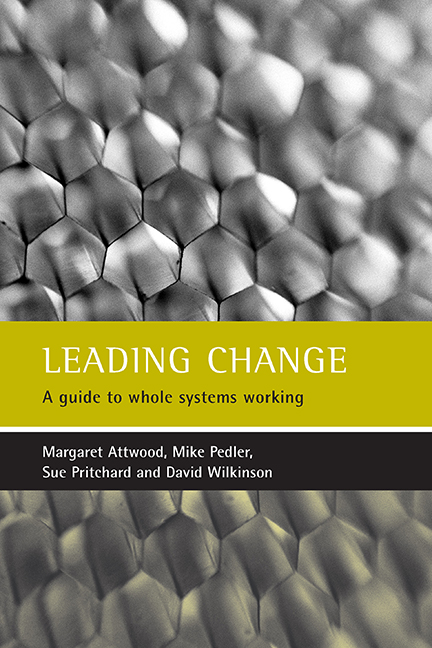Book contents
- Frontmatter
- Contents
- Foreword
- Foreword
- Prologue
- one Why do we need whole systems change?
- Two How Do We Put These Fine Words Intoaction? An Overview of Whole Systems Development
- Three The emerging practice of wholesystems development
- Four Leadership: keeping the big picture in view
- Five Public learning
- Six Valuing difference and diversity: getting the whole systeminto the room
- Seven Meeting differently: large and small group working
- Eight Follow-through and sticking with it
- Nine From organisations to networks
- Ten Confirming cases: local problems andlocal solutions within whole systems
- Epilogue
- Bibliography
- Index
Epilogue
Published online by Cambridge University Press: 20 January 2022
- Frontmatter
- Contents
- Foreword
- Foreword
- Prologue
- one Why do we need whole systems change?
- Two How Do We Put These Fine Words Intoaction? An Overview of Whole Systems Development
- Three The emerging practice of wholesystems development
- Four Leadership: keeping the big picture in view
- Five Public learning
- Six Valuing difference and diversity: getting the whole systeminto the room
- Seven Meeting differently: large and small group working
- Eight Follow-through and sticking with it
- Nine From organisations to networks
- Ten Confirming cases: local problems andlocal solutions within whole systems
- Epilogue
- Bibliography
- Index
Summary
As noted at the outset, this book is based on a dialogue between the four of us, which has developed over the past six or seven years. Our prime motivation has been to understand and to improve our practice in a new area of work that brings together the hitherto disconnected activities of organisation development, community development and public service development.
We are excited by the emerging possibilities of the work, and this includes being sometimes downcast by the difficulties, complexities and depredations of what we have called Mad Management Virus. We have been sustained by working with many creative and engaging people, whose commitment and learning is infectious and encouraging.
The aim of the book is to help people in organisations work effectively aspart of a wider system of local communities, partner organisations, myriadnetworks and external relationships. While there are no simple prescriptionshere, we provide a framework to help people make sense of this new world ofpractice, without oversimplifying the complexity in the situation.
The various elements of our thinking and practice can be assembled in asynthesis that provides not so much a model, but more of a ‘retro-fit’ framework.This framework for whole systems development emerges as grounded theoryin particular contexts, and has three components: context, process and outcomes.
Whole systems development operates within a context of change defined by the underlying policy dilemmas and values that guide the work. The dilemmas provide the outer context; the values the inner. Within this context, the process of whole systems development work is defined by the Five Keys, and the outcomes change of this process are the substantive and specific outcomes of the particular task and the holding framework of the change architecture. A brief recapitulation of these elements serves as a summary of our argument.
Ten core values of whole systems development
Over time, we have developed a number of values in respect of our own activities. Some of these are personal values held over many years; others are more recent and stem from the experience of whole systems development work. As ever, we offer these ten core values in the spirit of learning rather than as ‘ten easysteps for consultants engaged with whole systems projects’. As stated in the Prologue, these are:
•optimism
•empathy and humility
•tenacity and courage
•learning
•whole systems perspective
•local knowledge
•local solutions
•building social capital
•celebrating small steps
- Type
- Chapter
- Information
- Leading ChangeA Guide to Whole Systems Working, pp. 183 - 192Publisher: Bristol University PressPrint publication year: 2003



